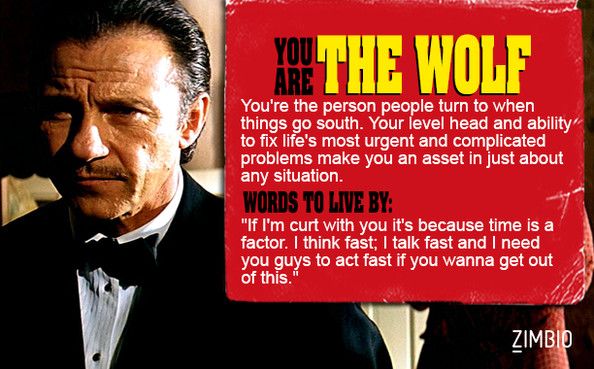Can you describe your role metaphorically?

If you’ve read the other posts I’ve published you’ll know I’m big believer in metaphor and story telling. It is the light speed fibre connection that brings humans together in the fastest way with minimal delay. Articulating your point with a story and/or using metaphor is an extremely powerful way of getting your message across. You can use this technique in persuading and influencing your audience to align with your point of view.
Last night I was talking with my wife about this topic in relation to our full time roles. We asked each other to describe each other’s roles metaphorically. It was an interesting (and fun) conversation and I ended up breaking mine into two examples using Dwight Eisenhower’s Urgent-Important Principle:
1. URGENT: The Wolf is here to solve your problems
Pulp Fiction become a classic film as it revolutionised how movies were made. It is one of my favourite films and has many great characters, scenes and quotes. One in particular is the introduction of Winston Wolf. He is a fixer and comes in to solve urgent and complicated problems. He assesses the situation, leverages the available resources. He then delegates/executes in a calm and controlled manner. In Pulp Fiction he has to deal with a unique and delicate issue (I won’t go into the scene in detail here although you can watch the scene below). It is resolved in a simple and structured manner. Everybody then goes about their day with that stressful situation behind them.
I get involved in many urgent and challenging situations in my role. We may have sales opportunities where problems arise and/or aspects which haven’t gone to plan. My team is called in to help provide assistance. Similar to Wolf’s approach, we work with the team and assess the situation. Once we know the customer, the goal and the problem (e.g. using design thinking and UX techniques) we put together a plan and execute. I found this image below from Quotagram (URL) which sums up how Wolf thinks and works. This is about short term thinking and getting shit done (excuse the choice of words here).

2. IMPORTANT: Simon Sinek (aka Mr Why)
Mr Why is the other half of Eisenhower’s Urgent-Important principle spectrum. When I am not in urgent mode I like to leverage Simon Sinek’s approach to working with people in solving problems. In September 2009 Sinek presented a classic TED talk on how great leaders inspire action:
He quotes the below statement 18 times during this particular TED talk:
People don’t buy what you do they buy why you do it
Whenever I’m working on a new customer, new team or new project I take a step back and leverage Sinek’s superpower. It’s simply about understanding the “who” and the “why”. It allows you to take the time to understand what you’re trying to achieve (the problem) and how to get to resolution (the solution). Getting this approach right up front is key. It lays the foundation of what you will do. If you want to learn more about the broader topic and how the “why” concept fits in to the broader picture, I suggest you read my review Infinite Game by Simon Sinek.
What about you?
Think about how you would describe your role and what you do using metaphor and story telling. Move away from the what and focus on the who and the why. Leverage your superpower like the many metaphorical super-communicators such as Steve Jobs, Simon Sinek and Seth Godin.



